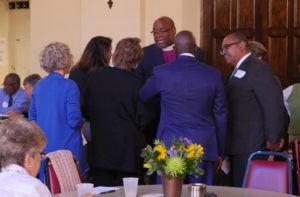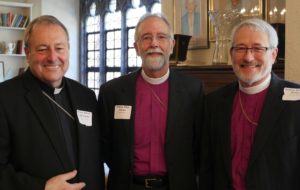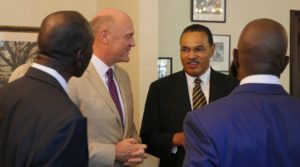Wednesday, October 12, 2016

SCUMC Bishop Jonathan Holston (facing) answers questions from eager listeners, including USC and Clemson senior staff
Satterlee Hall at Trinity Episcopal Cathedral in Columbia was filled with people, passion and enthusiasm for public education on October 12th at the 2016 SC Bishops’ Dialogue on Public Education. Present were educators, legislators, bishops and clergy from four denominations, churchgoers, tutors, mentors, university administrators, faculty and more. Bishops present were Robert Guglielmone, Roman Catholic Diocese of Charleston; Jonathan Holston; United Methodist Conference, South Carolina, Skip Adams, The Episcopal Church in South Carolina; and Andrew Waldo, Episcopal Diocese of Upper South Carolina.
The keynote speaker was Dr. Freeman Hrabowski, President of the University of Maryland, Baltimore. Hrabowski is a renowned educator and speaker with a track record of immense success in the field of higher education. One of Hrabowski’s long-time mentees is Dr. Jim Clements, President of Clemson University. Clements was one the special guests at the Dialogue, which included State Superintendent of Education Molly Spearman, SC Representative Joe Neal, USC Provost Joan Gabel, and Tammy Pawloski, Director for the Center of Excellence for Preparing Teachers of Children of Poverty at Francis Marion University.

Roman Catholic Bishop Bob Guglielmone (left), new Provisional Bishop of The Episcopal Church in South Carolina Skip Adams (center), and Bishop Andrew Waldo of The Episcopal Diocese of Upper South Carolina (right)
The SC Bishops’ Public Education Initiative has focused primarily on being engaged with pre-school and early-elementary children in public schools and on advocating for robust legislative support for public education. Today, Hrabowski offered a powerful story with a deeply important vision: Impoverished children in our public schools not only thrive at the beginning of their education when communities care for and participate in their journeys, but children blossom when the possibility of higher education nourishes their inquiring and discerning hearts, strengthens them with courage to will and to persevere, and blesses them with joy and wonder in all creation.
Bishop Waldo introduced Dr. Hrabowski with this phraseology from a prayer for the gifts of the Holy Spirit in the Book of Common Prayer’s baptismal liturgy. The bishop colleagues in SC believe that it is our common life-giving task to recognize and raise up the gifts God has given each and every child from birth. The question in front of the room was – how can we, as Christians and educators and members of the community, help our schools and government raise up these gifts and how can we each personally make a contribution? In his closing remarks, Bishop of The Episcopal Church in South Carolina, Skip Adams, told those gathered that his mother had taught him “never to pray for anything for which you are not willing to be a part of the solution.” After an inspiring talk from Dr. Hrabowski, dialogue and meaningful comments from the special guests and bishops, participants were asked to address postcards to themselves with a note answering the question of what they personally will do to make a difference.

President of Clemson University, Dr. Jim Clements (center left), along with Clemson senior staff, chats with Dr. Freeman Hrabowski (center right)
A common theme that emerged as questions were answered and conversation ignited, was that of relationships. Speakers from all fields present spoke of the power of relationships and how having mentors and healthy, supportive adult relationships are a key to success. Paired with opportunities for education, a child’s dreams of success are limitless.
The goals of the SC Bishops’ Public Education Initiative are:
- To raise up tutors, mentors and after-school enrichment volunteers across the state in support of SC’s hard-working teachers and of under-served children, aiming big, for most of the 800,000 parishioners in the judicatories’ churches will make being in relationship with children a part of what they do as people of faith.
- To be in ongoing dialogue with the SC General Assembly and Dept of Education to support, encourage and ultimately transform SC’s educational system into a more equitable system and to raise up the truly great work being done by so many SC teachers and administrators.
The gathering of bishops began in the 1980s with ecumenical intention toward Christian unity. Including bishops of the Lutheran, Anglican (Episcopal), Roman Catholic and United Methodist Churches, it has been called for most of its history by the acronym, “LARCUM.” Those of us who came into office in the last 5-10 years recognized two things: First, that traditional African-American denominations with bishops had not been included in the original ecumenical group. Second, that we as bishops, were less interested in talking about Christian unity and more interested in enacting Christian unity by undertaking God’s mission together.
Those realities have resulted in important changes. Today, it was announced that LARCUM is no more, and that we will be henceforth known as The Fellowship of South Carolina Bishops. At this point that includes the African Methodist Episcopal, Roman Catholic, United Methodist, Episcopal and ELCA Lutheran Churches. The SC Bishops’ Public Education Initiative is a joint project of the Fellowship.